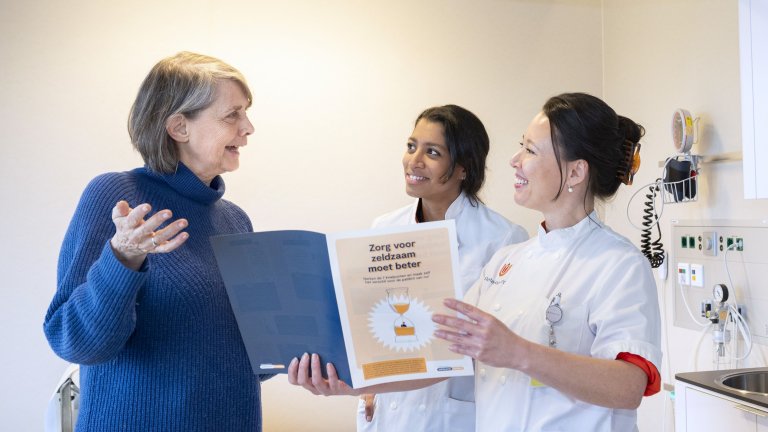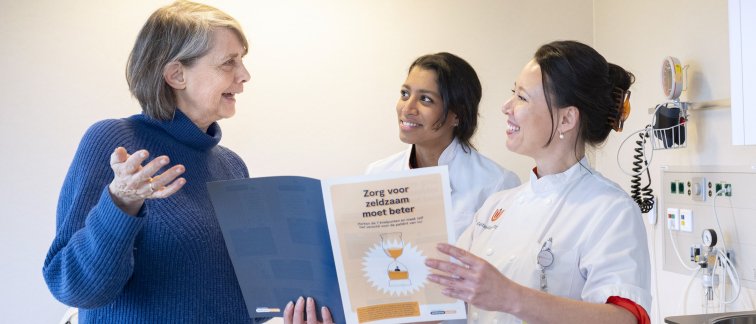The Department of Urology at Amsterdam UMC, which specializes in high urinary tract tumors, integrates a compassionate approach to patient care that acknowledges these emotional and informational needs.
For patients with rare cancer, it is often challenging to find reliable information about the disease and to understand treatment options. Feelings of loneliness are not uncommon among these patients, with limited peer support and a sense of being misunderstood by those around them. Recognizing this, the Department of Urology at Amsterdam UMC, which specializes in high urinary tract tumors, integrates a compassionate approach to patient care that acknowledges these emotional and informational needs.

Patient advocate Djuna Denkers offers an infographic to Joyce Baard, a urologist/clinical epidemiologist and PhD candidate on upper tract urothelial cancer and Orlane Figaroa, a PhD candidate researching better detection and treatment of upper tract urothelial cancer. Both doctors are affiliated with Cancer Center Amsterdam.
Expertise Centre on Upper Tract Urothelial Cancer
"Upper tract urothelial cancers are malignancies that occur in the lining of the urinary system, specifically the ureter and renal pelvis. These conditions are very rare, about 2 in 100,000 people. For treatment, specialized care is essential. "Since becoming an accredited center of expertise in 2021, we've seen more urologists referring patients, often at advanced stages. Our expertise, however, is also crucial at early diagnosis stages," Joyce and Orlane explain.
Connection and Knowledge
The team collaborates with “kanker.nl” and with the Patients' Platform for Rare Cancers (PZK) to provide accurate information to patients. An information page and a newsletter have been created in partnership with PZK to aid patients in navigating their journey.
“During the Week of Rare Cancers, we will send the newsletter to all our patients, along with a survey to identify topics of interest for patients and their loved ones that can be discussed at future patient information meetings. We are planning the first patient information meeting soon. We think these meetings will not only be informative but will provide an opportunity to exchange experiences with peers, which can help reduce the feelings of loneliness.”
The team will also use PROMS (Patient Reported Outcome Measures), questionnaires about how patients experience their quality of life, to monitor how the patient is doing and tailor care accordingly, supported by a specific care pathway for this group of patients.
Other Care Improvement Initiatives
“We have all the options for treatment in-house and can discuss these different options with the patient. We tell them what the effects are, the pros and cons. Deciding together with the patient what is the best option is very important to us."
About 30% of patients receive kidney-sparing treatment, depending on tumor characteristics, followed but intensive check-ups every three months to monitor both the disease's progression and the patient's quality of life.
What can we improve?
"Good supervision throughout the entire process of diagnosis, treatment, monitoring, and aftercare by a physician assistant is a must. We are currently training new physician assistants to increase support throughout the process. They will act as an accessible first point of contact for people who have concerns or questions - there should be no barrier to contacting the hospital.”
Addressing the needs of patients with limited health literacy is another priority, as engaging with digital patient records or completing PROMs may not be possible for everyone. The team is actively seeking solutions to assist these individuals more effectively.
This article has been translated and adapted by NHBC from the original: Knelpunt 5: ‘Je voelt je eenzaam en alleen met je ziekte, en weet niet wat je kunt doen' - Mieke | Zeldzame kankers

